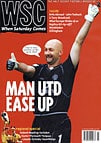 Is football a law unto itself? The normal freedom of movement laws don't appear to be used in football
Is football a law unto itself? The normal freedom of movement laws don't appear to be used in football
Is football a law unto itself? Perhaps the realisation is dawning that whatever practices have gone on in the past, it will be increasingly difficult for football clubs and associations to operate as if the law and normal rules of behaviour did not apply to them.
In the past month, three different issues have exposed the game’s startling tendency to try to hold the real world at bay. The ongoing saga of the European transfer system is covered in more detail on page 17. But throughout its tortuous progress, the one constant has been the insistence of the sport’s governing bodies that football is a “special case”, to which the normal rules on freedom of movement ought not apply.
It has been argued elsewhere in this issue that a more effective tactic would have been to highlight the similarities between football’s contracts and those in other industries. However, as with the Bosman case, the football bodies have been outmanoeuvred because they did not adapt their thinking quickly enough to the demands of European law.
Then there is the rapidly spiralling passports scandal, which so far has largely revolved around French and Italian clubs, though there is no reason to assume the same practices have not been equally widespread in Britain. Already St Etienne have been deducted seven points (suspended while they appeal) for knowingly conniving at passport irregularities, a penalty which would see them plunged into a relegation crisis if it were applied.
The drama brewing in Italy threatens to be even more explosive, with Roma demanding that Lazio be stripped of last year’s title (for using too many players acknowledged not to hold genuine EU documents) and Lazio in turn suing the coach of their city rivals, Fabio Capello. Roma themselves are also under investigation over players of alleged dual nationality and the role of their “transfer advisor” in procuring EU passports for other clubs.
What to make of it all? Whatever the outcome, the clearest thread to emerge so far is that clubs have pursued practices which are clearly dubious in the extreme, if not actually illegal. It must have been clear that they could not expect to get away with it forever, and that the consequences when found out could be monumental. But such is the craving for success, and the fear that by playing it straight they would be put at a disadvantage on the field, that the clubs would risk paying out vast transfer fees and wages for players who might ultimately prove all but worthless.
The third issue is specific to Britain, though no doubt we are not the only offenders here either. In January, a report in the British Journal of Sports Medicine slated football clubs for unnecessarily risking their players’ health through overuse, poor preparation and incompetence. On the professionalism of the medical staff used in football the report said: “In almost all clubs, methods of appointment of doctors are informal and reflect poor employment practice.” Around one-third of injuries, it reported, occurred in training.
It does not take more than a cursory glance through the newspapers to come across examples that suggest a devil-may-care attitude to injuries, even in today’s supposedly enlightened Premiership. Take these three in the past few weeks alone.
Edu, Arsenal’s new Brazilian secured after a seemingly endless saga (revolving around his passport, naturally), goes off after just 16 minutes of his debut at Leicester with a hamstring injury. According to Arsène Wenger, this just goes to show that you cannot pitch a new arrival straight into Premiership, where the pace is more relentless than in any comparable league. So why did he do it?
Then there was the experience of Kieron Dyer, who starred in Newcastle’s 3-1 win over Coventry, despite suffering from what was thought to be a shin splint injury. “You may have noticed that he didn’t take part in the warm-up,” Bobby Robson reported after the match. So a young player with a suspected overuse injury is unfit to warm up, but can play through a full match?
Even more crucial to his team than Dyer is Harry Kewell. After being out for such a long period, Leeds would surely not want to take a chance on bringing him back too early. Yet, sure enough, David O’Leary has plans for the Champions League tie against Anderlecht. “Harry is not fit by a mile yet,” he said. But “we may take a risk”.
So far no player whose career has been ended by injury has successfully sued a football club for failing in their duty of care towards them. But if a young and high profile casualty tried to do so, the sums at stake would be massive. Luckily for the clubs, they are above the law. Aren’t they?
From WSC 169 March 2001. What was happening this month